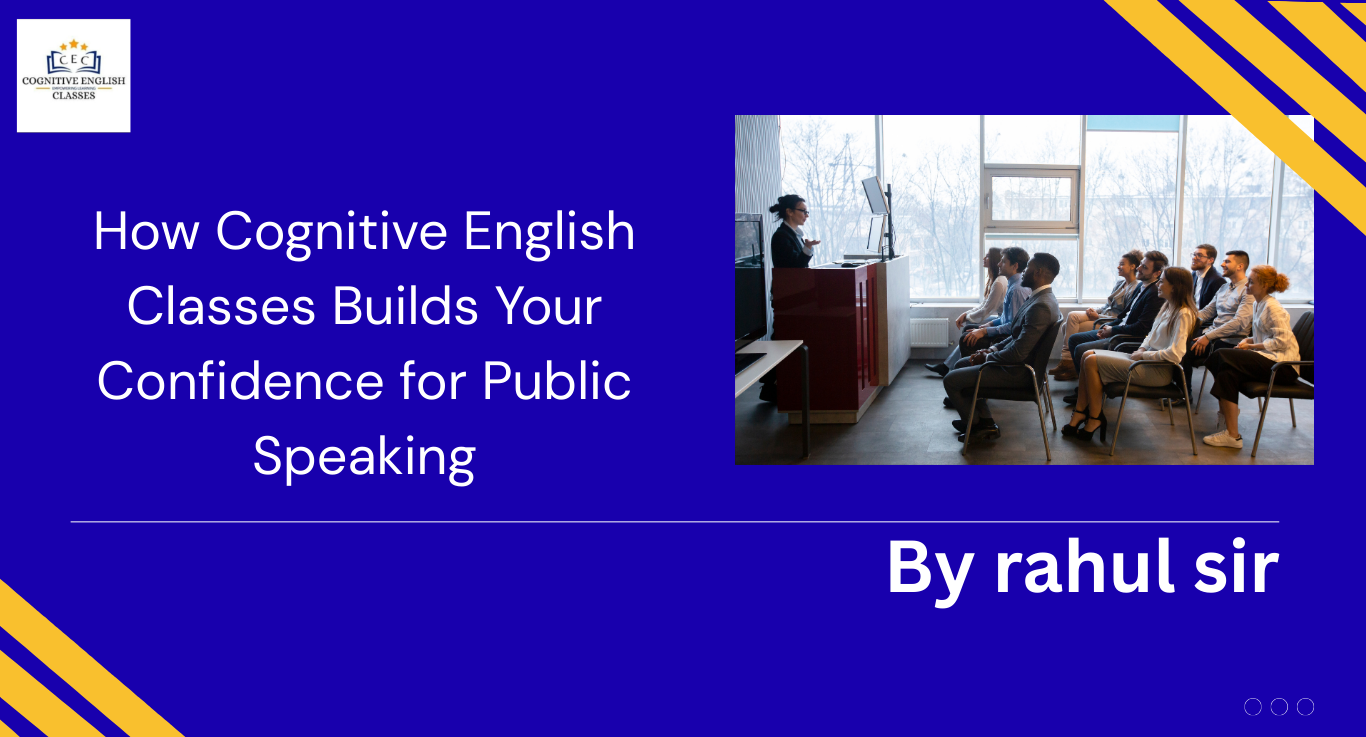How Cognitive English Classes Builds Your Confidence for Public Speaking
Public speaking is one of the most valuable communication skills in today’s world. Whether you are a student, working professional, business owner, or preparing for interviews, the ability to speak confidently in front of people can change your career and personality completely. But for many individuals, speaking English in public becomes stressful and fear-inducing.
The good news? Confidence can be built—with the right training, practice, and environment.
This is exactly what Cognitive English Classes provides: a step-by-step system to help students speak English confidently, fluently, and fearlessly.
In this blog, you will learn how Cognitive English Classes helps students transform from shy speakers into powerful communicators.
⭐ Why Most People Fear Public Speaking
Before learning how to build confidence, it’s important to understand why people hesitate:
- Fear of making mistakes
- Fear of wrong grammar
- Lack of vocabulary
- Low self-confidence
- Negative past experiences
- Nervousness about judgement
- Limited real-life speaking practice
Most traditional English classes do not address these psychological barriers.
But Cognitive English Classes focuses on both skill-building and confidence-building.
⭐ 1. Step-by-Step Confidence Training System
Cognitive English Classes doesn’t force students to speak immediately.
Instead, they follow a structured confidence-building method:
Step 1: Comfort Building
Students start with comfortable topics like self-introduction, daily routine, and personal interests. This reduces fear and helps them speak naturally.
Step 2: Small Group Speaking
Speaking in small groups builds confidence faster than speaking alone.
Step 3: Controlled Public Speaking Practice
Students present small topics in front of the class with guidance and support.
Step 4: Open Public Speaking Sessions
Once confidence rises, students perform open speeches, debates, and discussions.
This gradual approach helps students overcome fear and speak with ease.
⭐ 2. Practical Spoken English Activities (No Mugging!)
Confidence comes from real practice—not memorizing rules.
Cognitive English Classes includes:
🔹 Role Plays
Interviews, customer conversations, office role-plays—everything is practiced live.
🔹 Group Discussions
Students learn to speak, listen, respond, and express opinions like professionals.
🔹 Debates
Helps improve clarity, logic, and argument style.
🔹 Storytelling
A fun method to improve fluency and imagination.
🔹 Extempore Speaking
Instant speaking on random topics helps remove hesitation.
These activities ensure students practice public speaking daily, not occasionally.
⭐ 3. Personalized Feedback on Voice, Tone & Body Language
Public speaking is not just about words—it’s about delivery.
Cognitive English Classes provides training on:
- Eye contact
- Voice projection
- Body language
- Hand gestures
- Posture
- Pause & emphasis
- Audience connection
Students learn how to sound confident, not robotic.
⭐ 4. Correction of Grammar Without Interrupting Confidence
Many people fear public speaking because they are scared of making grammar mistakes.
But Cognitive English Classes follows the “No Fear Correction Method”:
- No interrupting while speaking
- No embarrassment
- Private, gentle correction
- Simple grammar tips
- Easy formulas for daily use
This helps students speak freely without feeling judged.
⭐ 5. Vocabulary Training for Public Speaking
To speak confidently in public, you need simple but powerful vocabulary.
Students learn:
- Impactful English words
- Transition phrases
- Presentation vocabulary
- Expression-based sentences
- Corporate and interview language
Examples:
- “In my opinion…”
- “I would like to highlight…”
- “Let me explain this further…”
- “One key point to note is…”
These sentences help students sound fluent instantly.
⭐ 6. Confidence Psychology Techniques
Cognitive English Classes integrates modern confidence psychology into training, such as:
✔️ Positive speaking mindset
Students learn to remove negative thoughts like “What if I make a mistake?”
✔️ Fear reduction exercises
Breathing, visualization, and power-posture techniques are used.
✔️ Confidence diary
Students maintain a daily journal of improvements.
✔️ Self-recording technique
Hearing your own progress builds confidence 2x faster.
This blend of psychology + communication training delivers powerful results.
⭐ 7. Real-Life Presentation Training
Students also practice:
- Office presentations
- Academic presentations
- PPT speeches
- Seminar speaking
- Interview introductions
By the end of the program, every student can present confidently with structure and clarity.
⭐ 8. English Speaking Environment That Builds Confidence Naturally
At Cognitive English Classes, the atmosphere is:
- Friendly
- Supportive
- Motivating
- Encouraging
- Judgement-free
Students from different backgrounds help each other improve.
The environment itself reduces hesitation.
⭐ 9. Daily Public Speaking Tasks (30-Day Confidence Boost System)
Students are given daily tasks like:
- Speak for 2 minutes
- Record a 1-minute audio
- Read aloud for 5 minutes
- Talk to a classmate for 3 minutes
- Share one opinion daily
These micro-habits build macro-confidence.
⭐ 10. Personality Development Training Included
To enhance public speaking, students also develop:
- Leadership skills
- Thinking speed
- Emotional control
- Stage presence
- Conversation skills
- Interview personality
This holistic development makes students stand out in professional environments.
⭐ Real Results: How Students Transform
Before joining:
❌ Low confidence
❌ Weak grammar
❌ Fear of public speaking
❌ Nervous body language
❌ Broken English
After training at Cognitive English Classes:
✔️ High confidence
✔️ Fluent speaking
✔️ Clear grammar
✔️ Strong stage presence
✔️ Professional communication skills
Hundreds of Faridabad students have already transformed their communication—and you can too.
⭐ Final Words
Public speaking in English is not difficult when you are trained the right way. With daily practice, psychological support, and step-by-step speaking activities, Cognitive English Classes helps students become confident, fluent, and fearless speakers.
If you’ve been struggling with stage fear, hesitation, or low confidence, this is the perfect place to start your transformation.http://wikipidea.com



